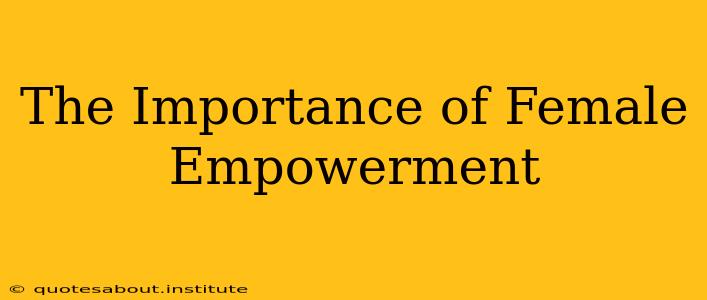Female empowerment is more than just a trending topic; it's a fundamental human right and a critical driver of global progress. Empowering women and girls isn't simply about fairness; it's about unlocking the vast potential within societies worldwide. When women are empowered, communities thrive, economies flourish, and the world becomes a more equitable and just place. This article delves into the crucial aspects of female empowerment, exploring its multifaceted benefits and addressing common questions surrounding this vital issue.
What is Female Empowerment?
Female empowerment encompasses the process of enabling women and girls to exercise their agency, make informed choices, and fully participate in all aspects of society. This includes access to education, healthcare, economic opportunities, political representation, and freedom from violence and discrimination. It's about challenging patriarchal norms and creating a level playing field where women can reach their full potential without facing systemic barriers.
Why is Female Empowerment Important?
The importance of female empowerment transcends individual lives; it has profound societal impacts. Empowered women contribute significantly to:
- Economic Growth: Studies consistently demonstrate a strong correlation between female economic participation and national GDP growth. When women have equal access to education, employment, and financial resources, they contribute significantly to the overall productivity and prosperity of their nations.
- Improved Health Outcomes: Empowered women are more likely to seek healthcare, make informed decisions about their reproductive health, and ensure the well-being of their families. This leads to improved maternal and child health outcomes, reducing mortality rates and promoting healthier populations.
- Reduced Poverty: Empowering women economically can significantly reduce poverty rates, particularly within families and communities. When women have control over their own finances, they can invest in their children's education, improve household living standards, and contribute to their families' financial security.
- Stronger Communities: Empowered women are active participants in their communities, contributing their skills, knowledge, and leadership to local development initiatives. They often play crucial roles in fostering peace, promoting education, and advocating for positive social change.
- Enhanced Governance and Political Participation: Increased female representation in government and decision-making positions leads to more inclusive and effective governance. Women bring diverse perspectives and priorities to the table, resulting in policies that better address the needs of the entire population.
What are the Barriers to Female Empowerment?
Despite significant progress, significant obstacles continue to hinder female empowerment globally:
- Gender-Based Violence: Violence against women remains a pervasive and devastating issue, severely restricting their ability to participate fully in society. This includes physical, sexual, and emotional abuse, as well as harmful traditional practices.
- Discrimination and Inequality: Women often face systemic discrimination in education, employment, and legal systems, limiting their opportunities and perpetuating gender inequality. This includes unequal pay, lack of access to leadership roles, and discriminatory laws and policies.
- Lack of Access to Education and Healthcare: In many parts of the world, girls and women lack access to quality education and healthcare, hindering their personal development and limiting their life choices.
- Cultural and Traditional Norms: Harmful cultural norms and traditional practices often restrict women's mobility, decision-making power, and overall autonomy.
How Can We Promote Female Empowerment?
Promoting female empowerment requires a multi-pronged approach involving individuals, governments, and organizations:
- Education and Awareness: Raising awareness about gender equality and empowering women through education is crucial. This includes challenging harmful stereotypes and promoting gender-sensitive curricula.
- Policy Changes: Governments must enact and enforce laws and policies that protect women's rights, promote gender equality, and address discriminatory practices.
- Economic Opportunities: Investing in women's economic empowerment through access to education, skills training, and entrepreneurship opportunities is essential.
- Access to Healthcare: Ensuring access to quality healthcare services, particularly reproductive health services, is vital for women's well-being and autonomy.
- Ending Violence Against Women: Strengthening legal frameworks, supporting survivors, and preventing violence against women are crucial steps towards empowering women.
How does Female Empowerment impact the Economy?
(Addressing a common PAA question) Female empowerment significantly boosts economic growth. When women have equal opportunities in education and employment, they contribute their skills and talents to the workforce, increasing productivity and innovation. This leads to higher GDP growth, improved living standards, and reduced poverty rates. Furthermore, women-owned businesses often create jobs and contribute to economic diversification.
What are the challenges in achieving gender equality?
(Addressing a common PAA question) Achieving gender equality faces many interconnected challenges. These include deeply ingrained societal norms and biases, unequal access to resources and opportunities, legal and policy frameworks that discriminate against women, and the persistent threat of violence against women. Overcoming these obstacles requires a multifaceted strategy involving legislative changes, social awareness campaigns, and economic empowerment programs.
What are some examples of successful female empowerment programs?
(Addressing a common PAA question) Numerous successful programs globally focus on female empowerment. These include microfinance initiatives that provide women with access to credit, educational programs that promote girls' enrollment and completion of schooling, and legal aid services that help women access justice. Successful programs often combine economic empowerment with educational and social support, addressing the multifaceted barriers women face.
Conclusion
Female empowerment is not merely a social justice issue; it's a catalyst for global progress. By investing in women and girls, we invest in a brighter future for all. Through concerted efforts to overcome existing barriers and create a more equitable world, we can unlock the full potential of women and build stronger, more prosperous, and more just societies. The journey towards gender equality is ongoing, but the rewards – a more equitable and thriving world – are immeasurable.

